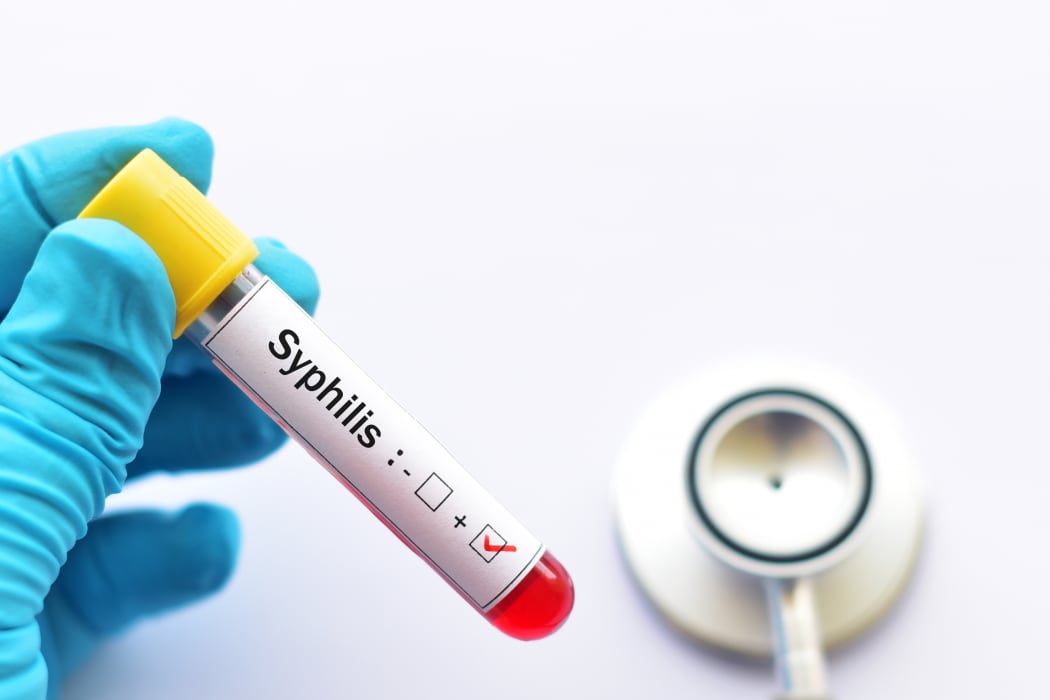The Ministry of Health has launched a new working group to tackle the spread of sexually transmitted and blood-borne viruses and diseases, including syphilis, HIV and hepatitis C.

Syphilis is a sexually transmitted infection which left untreated can affect the brain, spinal cord and other organs. Photo: 123RF
A Ministry spokesperson said the group is expected to help draft a virtual elimination strategy for the conditions and report back to Associate Health Minister Dr Ayesha Verrall by the end of the year.
It will include clinicians, researchers and community organisations across the sector, as well as representatives from a number of government agencies. But the Ministry is refusing to release any more details on the Sexually Transmitted and Blood Borne Infections Strategy working group.
Hepatitis C is the leading cause of New Zealanders receiving liver transplants and a major source of liver cancer.
Counties Manukau Health recently unveiled a new hepatitis C testing and treatment service at 17 pharmacies in south Auckland. Under the scheme, chemists are equipped to test for the virus via a quick finger-prick and provide treatment for those who test positive.
Dr Peter Saxton is a senior lecturer in population health at the University of Auckland's medical and health sciences faculty. His research includes work on the control of sexually transmitted diseases.
He said any work to try and eliminate diseases and illnesses like HIV, syphilis and hepatitis C has to be applauded.
"It's what we've wanted to see for a long time," he said. "Covid-19 has demonstrated how we can use an elimination strategy to deal with a virus and that can now be applied to other infectious diseases."
And while the working group is still in its infancy, he said it's a step in the right direction.
Syphilis is a sexually transmitted infection which can be treated and cured with antibiotics. But if it isn't treated, over time it can affect the brain, spinal cord and other organs.
Parliament's health select committee released a report in March as part of its 2019/2020 annual review of the Counties Manukau DHB and found 40 percent of syphilis cases in New Zealand were in the Counties Manukau area.
Saxton said using a contact tracing system is an important way to stop the spread of such conditions and it has to be considered as a key part of the working group's strategy.
"There are stigmas attached to all infectious diseases, including Covid-19 and STIs (sexually transmitted infections). But when people know that their privacy will be protected they are more likely to take part."

Dr Ayesha Verrall Photo: RNZ / Samuel Rillstone
The most up to date data released by the Institute of Environmental Science and Research (ESR) from 2020 shows a total 589 cases of syphilis were recorded nationally in the 12 months to the end of June last year.
Dr Massimo Giola is a member of the New Zealand Sexual Health Society's executive and a practising physician. He confirmed he is part of the newly formed working group.
He said he could not comment on the new body, but was enthusiastic about its role.
According to figures released by the University of Otago's AIDS Epidemiology Group in May there were a total of 162 people recorded as having HIV in New Zealand last year. HIV, or human immunodeficiency virus, damages the immune system and is spread through unprotected sex and contact with infected blood.
Associate Minister of Health Dr Ayesha Verrall's office was contacted for this story, but referred all questions to the Ministry of Health.

Local Democracy Reporting is a public interest news service supported by RNZ, the News Publishers' Association and NZ On Air.




